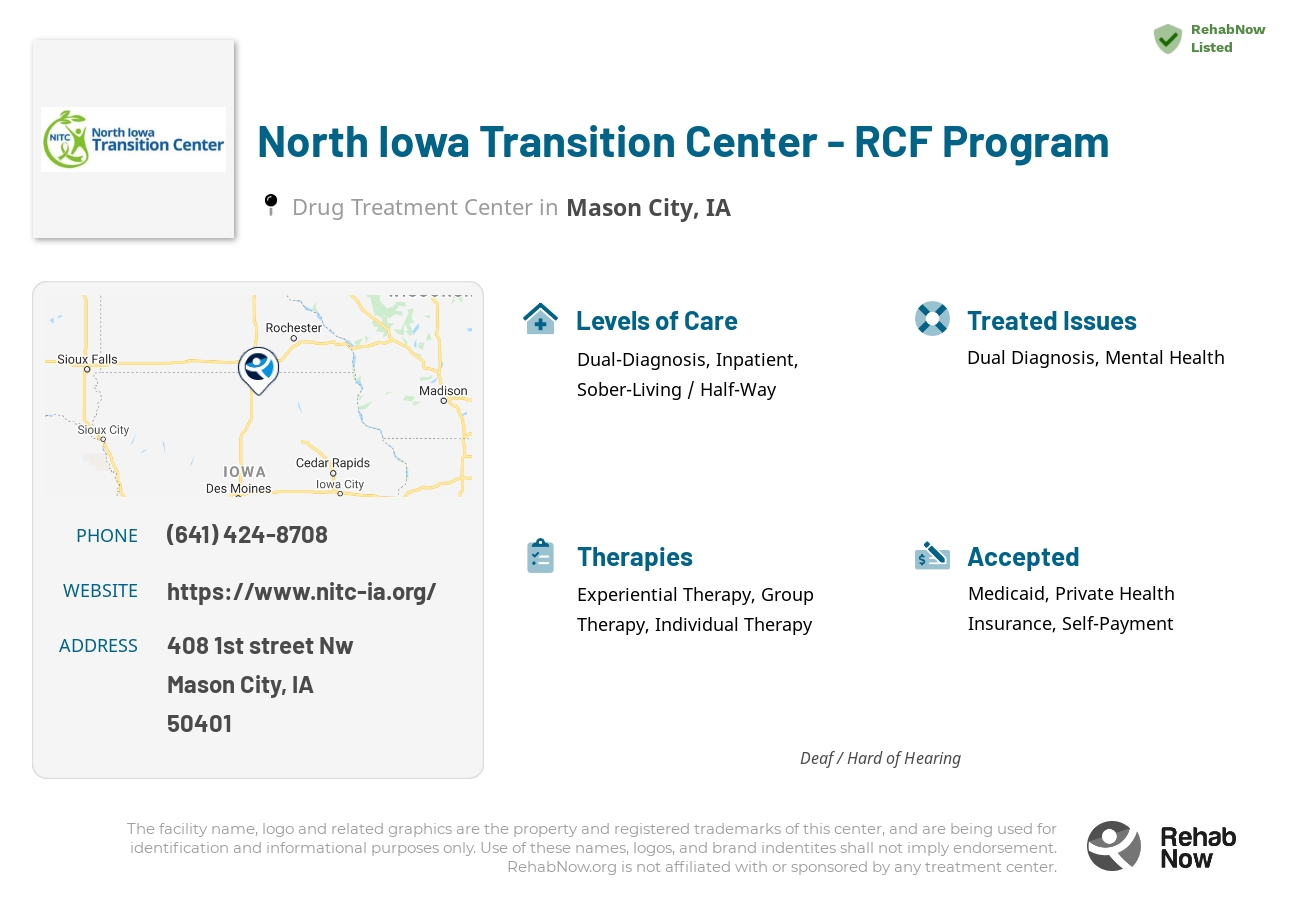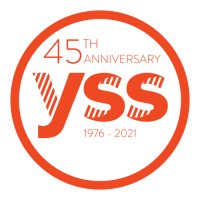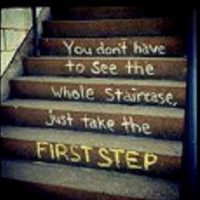North Iowa Transition Center - RCF Program
Drug Rehab Center in Mason City, Iowa
North Iowa Transition Center - RCF Program in Mason City, Iowa offers comprehensive dual-diagnosis treatment for individuals seeking recovery from addiction and substance abuse, with a range of levels of care and evidence-based therapies, as well as a supportive community.
About North Iowa Transition Center - RCF Program in Iowa
North Iowa Transition Center - RCF Program, located in Mason City, Iowa, is a reputable treatment facility that welcomes individuals seeking recovery from addiction and substance abuse. Their comprehensive approach to treatment combines both mental health and addiction treatment, making it an ideal choice for individuals struggling with Dual Diagnosis conditions. With a variety of levels of care available, including inpatient, sober-living/halfway, and residential programs, North Iowa Transition Center offers a range of options to suit different needs and preferences. They also accept private health insurance, which can help alleviate the financial burden of treatment.
North Iowa Transition Center - RCF Program provides a range of services and treatment methods to effectively address addiction and substance abuse. Their clinicians and medical professionals work closely with individuals to develop personalized treatment plans that cater to their specific needs. The center emphasizes a dual-diagnosis approach, recognizing the interconnectedness of mental health and addiction issues. Through therapy sessions, both individual and group, residents have the opportunity to explore the underlying causes of their addiction and develop strategies for relapse prevention. Alongside traditional counseling techniques, they offer evidence-based treatments, such as cognitive-behavioral therapy and motivational interviewing. Additionally, residents benefit from a supportive community and peer support, fostering a sense of belonging and encouragement throughout their recovery journey.
Genders
Ages
Modality
Additional
Conditions and Issues Treated
A “dual diagnosis” is when the individual has two medical issues at the same time. The top co-occurring mental disorders with addiction are depression, anxiety, ADHD, bi-polar disorder. Addiction is also considered a mental illness that is not a choice but rather a medical condition. Addiction can be caused by any number of underlying issues.
Dual diagnosis is provided by North Iowa Transition Center - RCF Program to treat addictive tendencies as well as any untreated mental illnesses. This ensures successful long term health and recovery for patients after treatment has been completed.
Dual diagnosis is provided by North Iowa Transition Center - RCF Program to treat addictive tendencies as well as any untreated mental illnesses for people in Iowa. This ensures successful long term health and recovery for patients after treatment has been completed.Levels of Care Offered
This center offers a variety of custom treatment tailored to individual recovery. Currently available are Dual-Diagnosis, Inpatient, Residential, Sober-Living / Half-Way, with additional therapies available as listed below.
Going to an inpatient rehab facility means living there while all aspects of addiction or co-occurring disorder get addressed. The treatment involves medical supervision, therapy, and future planning.
This type of rehabilitation provides a drug-free environment for people who struggle with chronic/long-term addiction without having access to drugs outside the center (or their own home). It takes away any distractions because they live there 24 hours per day. If someone is trying to break out old habits, which could lead them back into substance abuse, things like jobs or school can be put on hold until after they complete their stay to focus solely on recovery.
Sober living homes (abbreviated SLHs or sometimes sober houses ) are temporary housing for recovering addicts, most often those in early or mid stage recovery, who typically live in the home for 3 to 6 months.
The typical SLH functions as a halfway house, providing a stable living environment for addicts in recovery.
While at an SLH, residents typically meet with various therapists on site and attend regular 12-step meetings as well as other recovery group meetings.
Residential treatment programs are those that offer housing and meals in addition to substance abuse treatment. Rehab facilities that offer residential treatment allow patients to focus solely on recovery, in an environment totally separate from their lives. Some rehab centers specialize in short-term residential treatment (a few days to a week or two), while others solely provide treatment on a long-term basis (several weeks to months). Some offer both, and tailor treatment to the patient’s individual requirements.
Therapies & Programs
Individual therapy is a form of counseling where you meet with a trained professional one-on-one. Meeting with a therapist in this setting allows for a personal and trusting relationship to be built. This allows the patient to open up about sensitive or private issues they may not feel comfortable discussing in a group. Individual therapy helps identify the root causes of your addiction, which can help prevent relapse.
Group therapy sessions are another common addiction recovery service. These group sessions typically involve six to 12 addicts who meet regularly with a trained professional for support and guidance.
During these sessions, the group shares their experiences with one another and provides feedback that can help each member avoid relapse or overcome specific obstacles they are facing in their recovery process. With this type of support and guidance, addicts can feel like they are part of a community that understands their struggles and will help them get through the hard times.
Patient Experience
Experiential Therapy at North Iowa Transition Center - RCF Program
Drug addiction causes the formation of abnormal connections between neurons in the brain to form due to repeated exposure to drugs. These connections are responsible for addictive behaviors to drugs. Experiential therapy is done with patients individually and is different from traditional talk therapy. This therapy can help people revisit past traumas, heal, and move on in life in a more authentic way.
Experiential therapy uses activities to recreate experiences that may have caused trauma or negative emotions. These activities include role-playing, arts and crafts, animal care, music, or rock climbing. The individual will gradually experience calmness and love and change their perception positively through this therapy. Other than drug addiction, experiential therapy can be helpful for behavioral or eating disorders.
Payment Options Accepted
For specific insurance or payment methods please contact us.
Is your insurance accepted?
Ask an expert, call (888) 674-0062
Additional Details
Specifics, location, and helpful extra information.
Mason City, Iowa 50401 Phone Number(641) 424-8708 Meta DetailsUpdated November 25, 2023
Staff Verified
North Iowa Transition Center - RCF Program Patient Reviews
There are no reviews yet. Be the first one to write one.
Mason City, Iowa Addiction Information
Iowa ranks 2nd lowest in the nation for illicit drug use, but 12% of its residents are still using these drugs every single year. Methamphetamines account for more than 90% of all drug-related prison admissions in Iowa. Alcohol is the most widely abused substance in the state, with 23% of residents admitting to heavy drinking.
In Mason City, Iowa, over 1,000 admissions to treatment facilities for drug abuse in the city in a single year. Mason City had a higher-than-average abuse rate for drugs such as cocaine, heroin, and methamphetamines. Some of the most common treatments include inpatient rehabilitation, outpatient rehabilitation, and detoxification programs. Depending on the program, treatment may last anywhere from 30 days to a year or more.
Treatment in Nearby Cities
- Humboldt, IA (59.1 mi.)
- Sioux Center, IA (149.9 mi.)
- Sioux City, IA (168.4 mi.)
- Denison, IA (134.5 mi.)
- Harlan, IA (149.9 mi.)
Centers near North Iowa Transition Center - RCF Program
The facility name, logo and brand are the property and registered trademarks of North Iowa Transition Center - RCF Program, and are being used for identification and informational purposes only. Use of these names, logos and brands shall not imply endorsement. RehabNow.org is not affiliated with or sponsored by North Iowa Transition Center - RCF Program.




